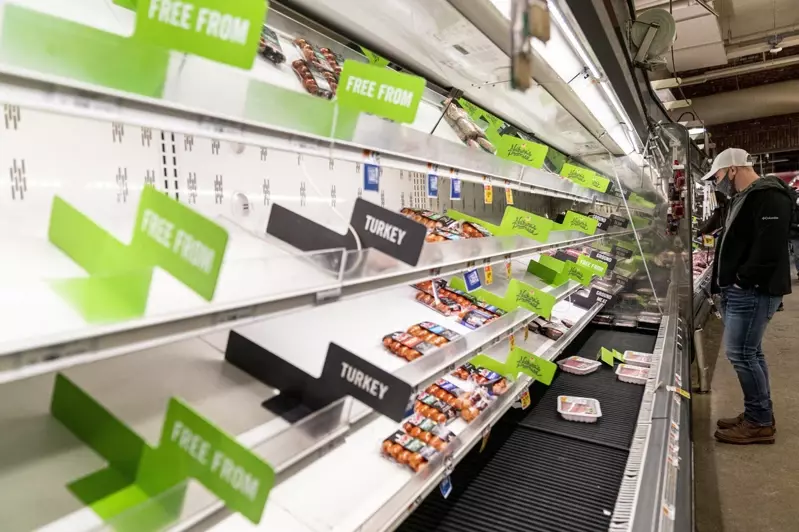
Why Are Supermarket Shelves Empty? Washington Post Analyzes 4 Major Reasons
A customer in Washington state stands in front of a supermarket shelf. (Associated Press)
(We Chinese in America Media Editor Tang Zhao, January 11, 2022)Not long after 2022 started, netizens shared photos of empty supermarket shelves on social networking sites, with everything from cream cheese to paper towels, children's juices, and cat food out of stock. The Washington Post analyzed that some of the reasons for this wave of shortages are the same as in the early days of the outbreak, and the emergence of some new challenges has made the situation more difficult.
The Washington Post analyzed that there are four main reasons for this wave of supermarket shortages:
Omicron variant spreads
The heating up of the epidemic has forced stores, including supermarkets, to step up cleaning and disinfection, resume wearing masks and require social distancing, but at the same time, more employees are taking sick leave. Geoff Freeman, CEO of the Consumer Brands Association, an industry group, said in a conference call with executives from 27 food companies on the 10th that the number of employees calling in sick in the past two weeks was higher than in all of 2020. Average stats are still high
Freeman said that this phenomenon is very alarming. He also encountered a shortage of 120,000 truck drivers across the country, and food processing plants are now short of about 10% of manpower. "The system is under a lot of pressure at the same time."
Stew Leonard Jr., the head of Stew Leonard's, a department store chain with stores in Connecticut, New York, and New Jersey, said that among its 2,500 employees, about 200 employees are currently affected by the outbreak and are sick or in quarantine. For example, he said, many employees called in sick leave, and due to the lack of manpower, some pizza flavors had to be scaled back.
Winter weather
After New Year's Day, winter storms brought more than 1 foot of snow in the Mid-Atlantic, road conditions in many areas have been poor for the past two weeks. Last week's 20-hour traffic jam on Interstate 95 (I-95) in Stafford, Virginia, was one example, where semi-trucks restocking supermarkets are stuck on the road.
Doug Baker, associate director of industry relations at FMI, a food industry group, said winter has always been more challenging, but now from coast to coast, the frequency and scale of severe weather is unprecedented. He said that the bad weather has affected the psychology of consumers. When people see photos of out-of-stock items in supermarkets, they will buy more supplies and stock up just in case.
The report pointed out that after the winter vacation, more than 5,000 schools in the United States delayed allowing students to return to campus due to the epidemic or weather. Many families therefore purchased more bread, meat, and processed cereals.
Supply chain crisis
"The countries where many of our materials and products come from are now experiencing outbreaks, and some countries are temporarily closing factories with strict measures, which delays the entire process," Buckle said. "It's not just a domestic issue, it's also about how other countries deal with Omicron. epidemic."
More people now choose not to go to restaurants
Factors such as rising prices and rising epidemics have made many families less likely to go to restaurants to eat. Winter storms have also increased consumer demand for groceries.
(Source: World Journal)










